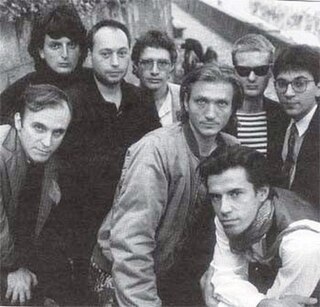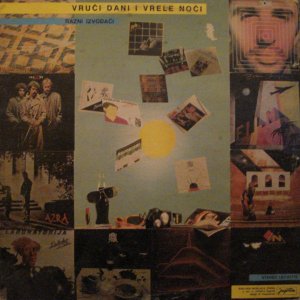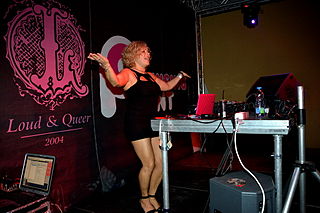Related Research Articles

Darko Rundek is a Croatian rock singer, songwriter, poet, and actor. His music career started in the early 1980s, as the frontman of the world music influenced rock band Haustor. He emigrated to France after the Yugoslav wars started in 1991, and has recorded eight albums with various musicians from different parts of the world: Apokalipso, U širokom svijetu, Ruke, MHM A-HA OH YEAH DA-DA, Balade Petrice Kerempuha, Plavi avion, Mostovi and Brisani prostor.

Zlatan Stipišić, also known as Gibonni, is a Croatian singer-songwriter and composer. He is one of the most successful and awarded recording artists from Croatia, receiving record-high 43 Porin music awards for his albums and songs.
Film is a Croatian and Yugoslav rock band formed in Zagreb in 1978. Film is generally considered one of the most prominent acts of the Yugoslav new wave scene, as well as one of the most notable acts of the Yugoslav rock scene in general.

Colonia is a Croatian dance music duo from Vinkovci, Croatia. The band has released thirteen albums and over 35 singles to date with various songs and albums gaining platinum status. They are known for winning the first ever Eurodance competition in 2001 and their various hits throughout the years.

Kemal Monteno was a Bosnian recording artist and singer-songwriter whose career stretched from the 1960s to the 2010s. He is widely considered one of the greatest songwriters of the former Yugoslavia.
Tram 11 is a Croatian rap group consisting of Nenad Šimun "Target" and Srđan Ćuk "General Woo". It is named after a tram line, number 11, that connects the western part of Zagreb from where Target is, with the eastern part where General Woo lived. It was one of the first prominent rap acts from Zagreb.

Haustor was a Yugoslav rock band formed in Zagreb in 1979. Haustor is considered one of the most prominent bands of the Yugoslav new wave scene, as well as one of the most notable and influential acts of the Yugoslav rock scene in general.

Hladno pivo is a Croatian punk rock band. The recording act, fronted by Mile Kekin, remains one of the most popular rock bands in Croatia.

Vrući dani i vrele noći is a compilation album released by Jugoton in 1982 in the former SFR Yugoslavia.

Svi marš na ples! is a compilation album released by Jugoton in 1981 in SFR Yugoslavia.
Vlak u snijegu, first called Djeca Velikog Sela --"The children of Veliko Selo") is a children's novel written by Croatian novelist Mato Lovrak (1899–1974), then a young schoolteacher inspired by actual events, in 1931.

Aleksandar "Aco" Petrović is a Croatian professional basketball coach and former player who is currently the head coach of the Brazil men's national team.

The Lika cap, also known as kićanka ("tassel") or crvenkapa, is an important cultural symbol of the Lika region in Croatia, part of the Lika national costume traditionally worn by local Croats and Serbs. It is cylinder-shaped, with a flat top in a red colour, black sides, and often with a black tassel in the back.

HRT 1 is a Croatian television channel, operated by public broadcaster Hrvatska Radiotelevizija (HRT). It is a generalist channel, whose diverse programming lineup includes news programming and other informative series throughout the different parts of the day, as well as a vast array of scripted and non-scripted original and acquired television series.
Mikša Pelegrinović was a Croatian poet.
Dubrovački trubaduri was a Croatian beat, folk and pop band from Dubrovnik formed in 1961 by Đelo Jusić, main composer, guitar and mandolin player and leader of the group. They were very popular in Yugoslavia during the 1960s and 1970s for their mixture of pop music and medieval folk traditions of their native ancient city on the Adriatic coast. Internationally also known as 'Dubrovnic Troubadours or The Troubadours Of Dubrovnik, they enjoyed brief popularity across Western Europe having appeared at the 1968 Eurovision Song Contest in London. Their song "Jedan dan" was performed by their singers Luciano "Lući" Capurso and Hamo Hajdarhodžić and it scored 7th position. Their other major hits include "Dok Palme Njišu Grane" from 1971, and the Italian-influenced "Noćna Muzika" from 1972. The group, in different line-ups, existed until the early 1980s when they broke up.

Massimo Moreno Savić, also known simply as Massimo, was a Croatian pop singer.

Marina Perazić is a Croatian and Yugoslav singer and DJ. Born in Rijeka, she gained prominence as a member of the synth-pop group Denis & Denis, which she formed with keyboardist and vocalist Davor Tolja, the two later joined by vocalist Edi Kraljić. In 1986, she left Denis & Denis to start her solo career. As a member of Denis & Denis, Perazić gained nationwide popularity, becoming one of the biggest stars of the Yugoslav rock scene and often being described as a sex symbol. After releasing her debut album Marina in 1987, she moved to New York City, where she spent the following ten years without recording or performing. She returned to Rijeka in the late 1990s, releasing her second and latest solo album Ista kao more in 1998. Since the 2010s, she has been performing as a DJ. In 2012, she took part in Denis & Denis reunion.
Letu štuke is a rock band from Bosnia and Herzegovina formed in 1986 in Sarajevo. They published a number of studio albums and gained mainstream popularity in the country with the songs Minimalizam, Mjesto za dvoje, Tesla, and others.
References
- ↑ "Postolar Tripper" (in Croatian). Menart Records. Retrieved 2008-07-30.
- 1 2 3 "Stiže prvijenac zadarskih postolara" (in Croatian). muzika. 2005-03-08. Archived from the original on 2005-03-10. Retrieved 2008-08-01.
- 1 2 "Postolar Tripper se vraća" (in Croatian). Groupie. 2008-07-09. Retrieved 2008-07-31.
- ↑ "Novi sigl Postolar Trippera" (in Croatian). Opcebito. 2008-07-09. Archived from the original on 2008-08-30. Retrieved 2008-08-01.
- ↑ "Postolar Tripper – Popravni (2008, CD)". Discogs .
- ↑ "Raspao se Postolar Tripper!". 2017-02-16. Retrieved 2021-07-15.
- 1 2 http://www.menart.hr/index.php?performer_id=492&show=discography (in Croatian)